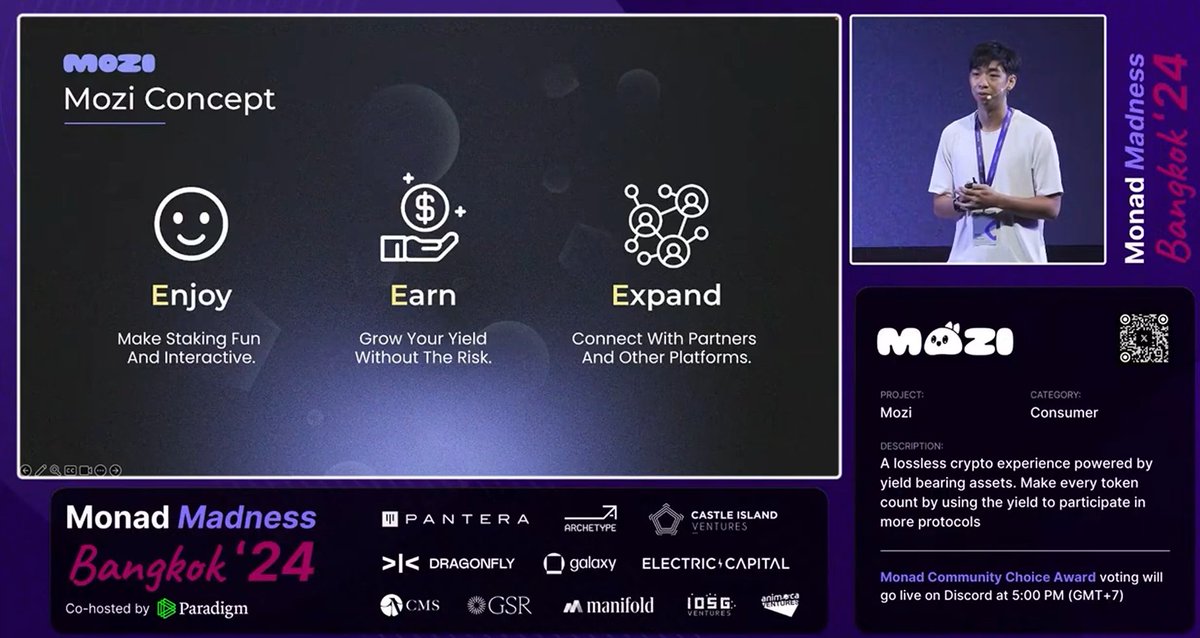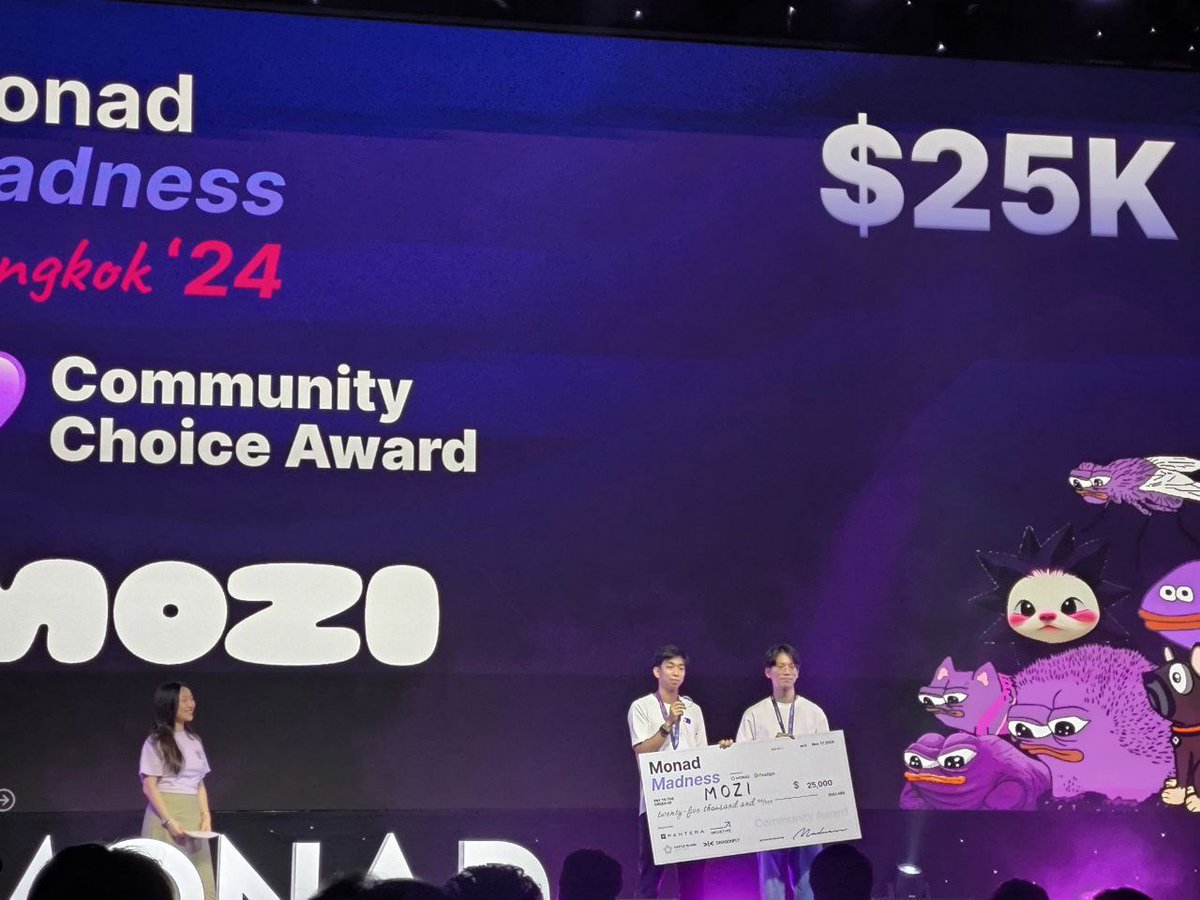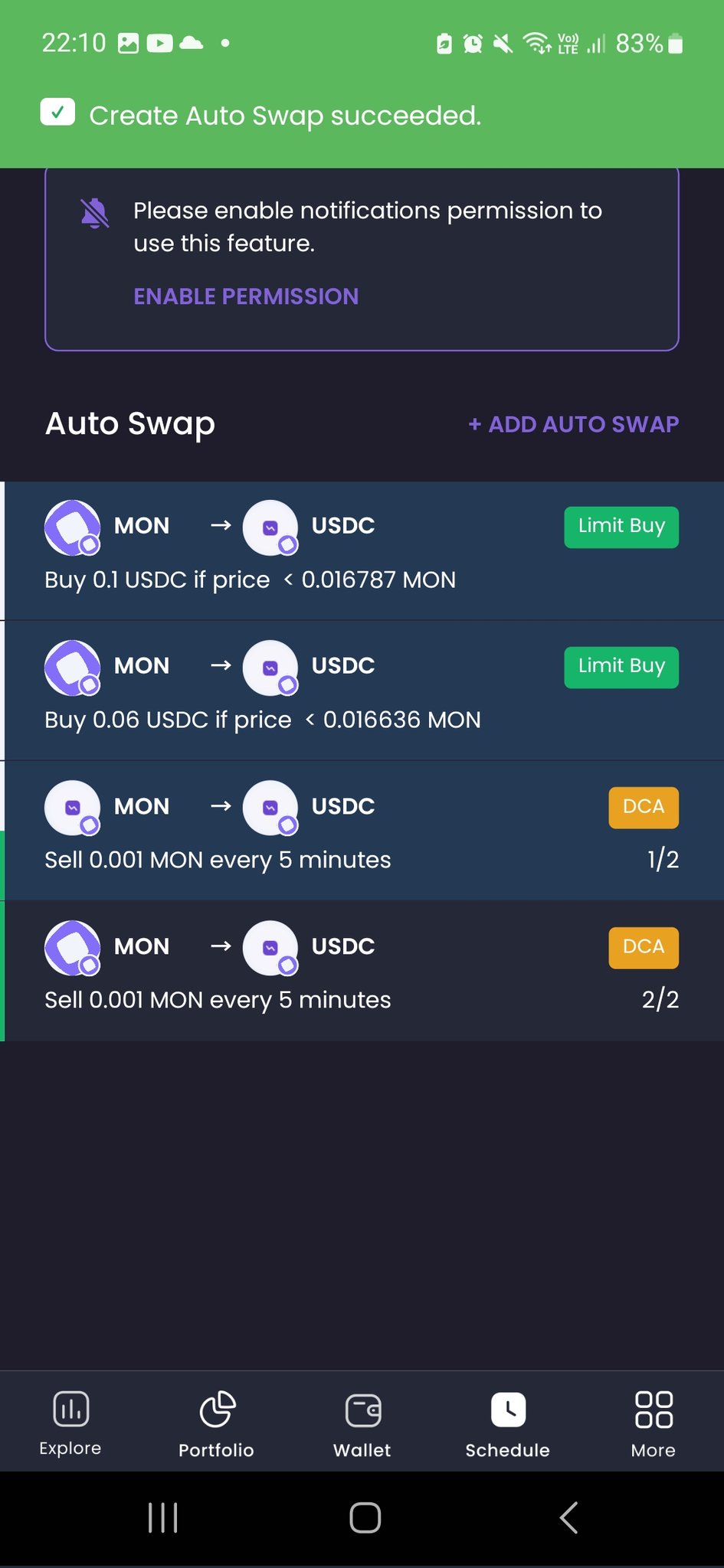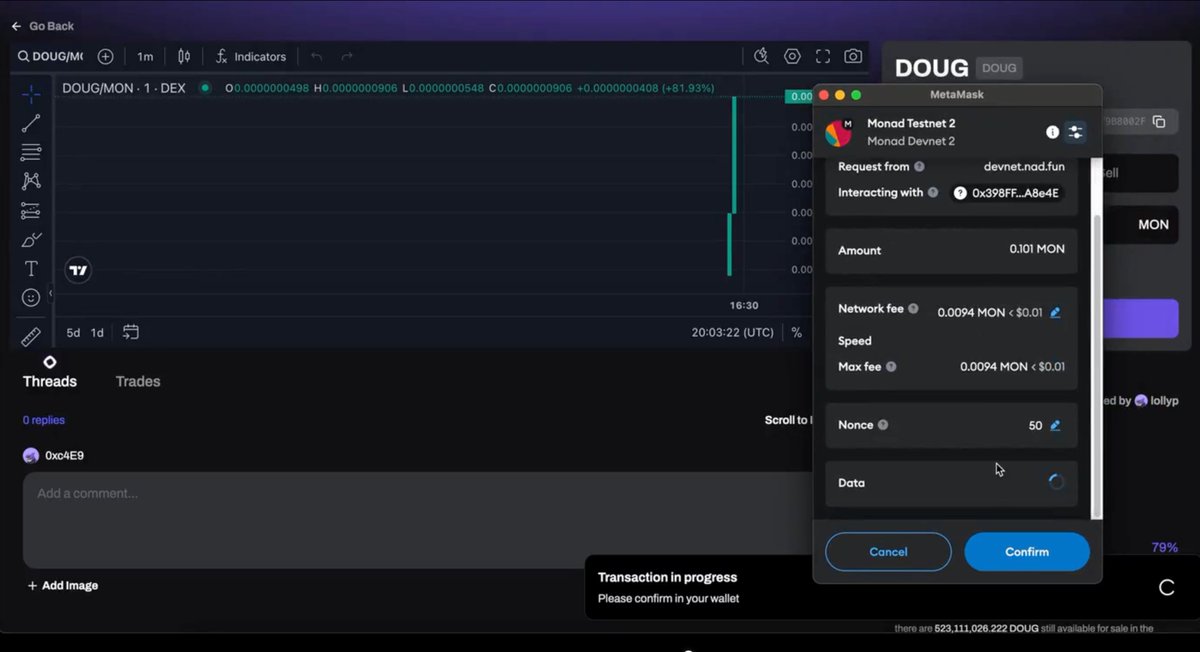Author: Harvey C
Introduction
As the @Monad_xyz ecosystem continues to grow, various projects are trying to leverage its high throughput, low Gas fees, and parallel execution capabilities. Among them, wallets and launchpads are particularly noteworthy, as they are often important entry points for users to interact with the ecosystem and can effectively promote community expansion. This article will focus on three Monad native projects - Mozi Wallet, Haha Wallet, and Nad.fun - which all aim to bridge the gap between DeFi and a broader user base. By exploring their key features and testnet activation strategies, we can better understand how they are leveraging Monad's technical foundation to deliver new experiences for users.
These projects have adopted various innovative approaches in practice, from lowering the barrier to entry through Telegram to introducing gamification elements in token issuance. Whether they can continue to attract and retain users in the long run remains to be seen. However, it is certain that these projects are bringing fresh vitality to the Monad ecosystem and providing more possibilities for future development.
Mozi Wallet
@mozifinance is a native wallet built on the Monad ecosystem, focusing on ease of use and yield-oriented features, aiming to establish a more direct connection between DeFi and everyday scenarios.
Core Features

Gang demonstrating the Mozi Wallet at the Monad Madness event in Bangkok
1. Mozi Wallet (Telegram MiniApp)
A key highlight of Mozi is its Telegram-based wallet functionality, which aims to eliminate the installation process of browser extensions like MetaMask. By completing transaction signing within Telegram:
Lower entry barrier: For new users accustomed to using messaging apps, the operating environment is more familiar.
Integrated staking management: Users can directly manage their liquid staking tokens (LST) from multiple staking platforms (such as Apriori, MagmaDAO, Kintsu, etc.) within the wallet.
Notification and in-chat operations: Users can check earnings, manage staking, and participate in games or DeFi applications without leaving Telegram.
2. Staking and Yield Conversion
The Mozi Wallet aims to allow users to complete token staking directly within the Monad (and potentially cross-chain) environment, and automatically convert the earned yields into usable assets. Theoretically, this will bring:
Instant availability of yields: Yields can be directly used for subscribing to services, in-game purchases, or other DeFi products.
Reduced tedious operations: No need for manual unstaking, cross-chain bridge conversion, etc.
3. Mozi Debit Card (Future Plan)
Mozi has also mentioned the idea of launching a debit card, allowing users to use their staking rewards for consumption like a regular payment card. This aligns with the project's goal of integrating Web3 rewards with the real-world economy.
4. Gamified Finance (PvPfi) and LST Integration
Mozi positions itself as a "PvPfi" platform, combining game mechanics with liquid staking tokens. Its Vault system aims to differentiate users' principal and yields, and provide the following features:
Security: The official treasury will be regularly audited, but the yield leverage mechanism: Users can temporarily use their yields (or even part of the principal) to enhance their in-game power or obtain higher returns.
Risk management: Although the yields are used for gaming, Mozi states that it will adopt "strict risk control" to ensure the safety of users' main principal as much as possible.
How Monad Supports Mozi's Vision

Mozi winning the community award at the Monad Madness event in Bangkok
1. High Performance to Support Real-World Use Cases
Due to Monad's high throughput and good scalability, Mozi can more efficiently handle frequent and micro-transactions. With the reduction in network latency and transaction fees, Monad supports Mozi in achieving higher frequency of yield conversion and micropayments.
Low Gas Fees: Can lower the cost threshold for integration between Web2 and Web3, making small transactions still viable.
Fast Execution: Ensures a smoother gaming experience and yield management process, which is crucial for Mozi's "gamified DeFi" focus.
2. Security and Stability
As an emerging Layer 1 blockchain, Monad provides a secure foundation for Mozi's staking and yield management. Mozi's treasury will also undergo audits in the future, which to some extent enhances user confidence and complements Monad's increasingly robust security system.
Mozi's Testnet Activation Strategy
To attract user participation when Monad's public testnet launches, Mozi is planning the following measures:
1. Leverage Telegram to Provide a Smooth Onboarding Experience
In a familiar application environment, new users can get up to speed more quickly. For example: publishing tutorials on how to manage wallets and staking within the Telegram MiniApp.
Hosting AMA sessions in Telegram groups, allowing users to raise questions and get immediate responses.
2. Strengthen Gamification Elements
Organize competition activities during the testnet phase to highlight the PvPfi mechanism and its leveraged yield features, allowing players to experience Mozi's unique gameplay in advance.
3. Collaborate with LST Providers
Plan to work with platforms like Apriori, MagmaDAO, Kintsu, etc. to showcase the composability of Mozi's vault, and launch various activities to attract users to explore more yield strategies.
4. Community Challenges and Incentive Measures
Provide rewards for early users willing to experience, provide feedback, and help identify issues. This not only generates a wealth of practical suggestions during the testing phase, but also helps solidify the core user base.
In summary, with Monad's support, Mozi aims to further change the industry's perception and usage of yields. It tries to make it more convenient for users to convert staking rewards into everyday usable value, while using gamification design to enhance engagement. Mozi's long-term success will depend on its testnet operation strategies, as well as its continued innovation in integrating DeFi and real-world consumption scenarios.
Haha Wallet
@haha_app Wallet is also a wallet solution based on Monad, aiming to deeply integrate with the Monad network and provide users with a more interactive, efficient, and secure DeFi experience. Here are its main features and how it collaborates with Monad technology.
Core Features

The user interface of the Haha Wallet
1. Smart Wallet Functions
Haha Wallet provides various tools to simplify operations: Scheduled Transactions and Automation Strategies: Users can plan transactions in advance or set up automated transaction logic, which may be more flexible and efficient in managing digital assets.
Multi-Signature Security: Supports multi-party signatures, which can enhance transaction security and require multiple parties to confirm before a transaction can be completed.
2. Integration with DeFi Services
Through collaboration with Kintsu, Haha Wallet will launch a liquid staking feature, allowing users to earn staking rewards while maintaining the liquidity of their assets.
3. Community Interaction and Incentives
To attract and retain users, Haha Wallet has also designed a series of incentive mechanisms: Quest Campaigns: Encourage users to deeply explore the Monad ecosystem and provide corresponding rewards.
Karma Ranking: Record user's various actions on the platform and use "Karma" points to redeem different privileges or benefits.
Haha's Testnet Activation Strategy
1. Quest Campaigns
Haha Wallet will gradually launch a series of quests, including operations within the wallet app as well as on social platforms like Twitter and Discord. Users who complete the specified tasks can receive corresponding rewards.
2. Community Participation Plan
To enhance community cohesion, Haha Wallet plans to implement the following measures: Karma Ranking: Continuously tracking user activities on the platform to accumulate Karma points, which can be exchanged for various practical functions within the ecosystem.
Referral Rewards: Allowing users to invite friends to join the Haha community through Discord, with both parties receiving Karma bonuses.
Time-limited Flash Quests: Launching short-term tasks daily, with immediate rewards upon completion, aimed at increasing activity and retention.
Leveraging Monad's technical advantages, Haha Wallet hopes to provide users with a secure and convenient asset management tool, while also fostering deeper user engagement with DeFi through various community activities. Its goal is to build an efficient and inclusive ecosystem that can better adapt to the opportunities brought by Monad, both in terms of performance and user experience.
Nad.fun
@naddotfun is another project built on Monad, self-described as a "gamified launchpad," which integrates token generation tools, gamification features, and community incentives to provide users with a more diverse token issuance and trading experience.
Unique Features of Nad.fun

Nad.Fun has been launched on Devnet
1. Integrated Issuance and Trading Model
Nad.fun aims to simplify the token issuance and trading process:
Bonding Curve Pricing: Using a bonding curve during the initial issuance to balance supply and demand.
DEX Integration: Once the bonding curve reaches an 80% liquidity threshold, the token can be listed on external decentralized exchanges to further increase liquidity.
Fee Model: Charging a 1% fee for token trades, with the revenue being injected into the platform's treasury.
2. Mint Party: Collaborative Token Issuance Inspired by the "team-up" mechanic in RPG games, Nad.fun's Mint Party encourages developers, opinion leaders, and regular users to collaborate:
Role Division: Developers are responsible for the technical aspects, while opinion leaders and active community members handle promotion and marketing to collectively complete the token issuance.
Shared Rewards: Once the token is officially launched, the participants will collectively benefit from the project's growth on the platform.
3. Quest Pool Incentive Mechanism
When project teams want to incentivize user participation, they can choose:
Task-based Rewards: Developers will deposit tokens into the Quest Pool, and users who stake or otherwise participate in the token can earn additional rewards from the pool.
Token Economic Model Optimization: By rewarding active community members, project teams may be able to extend the token's lifecycle more effectively.
4. Gamified Rake-Back Structure
Nad.fun has added a gamified approach to its revenue distribution model:
Vote-based Profit Sharing: Users earn voting rights based on their trading volume and can make predictions on popular token categories (e.g., "Dog," "Trump"), with correct predictions earning additional rewards.
Community Interaction: This feature makes the revenue distribution more entertaining, as users can earn more by correctly identifying market trends.
5. Expanding to Social-Fi
Nad.fun has also integrated social elements into the platform to enhance the trading experience:
Achievement System: The platform will award badges for important actions, such as creating tokens, holding low-cap assets, or making profitable trades, helping users build reputation and trust within the community.
Trending and Watchlist Features: Users can follow specific wallets to track their trading activities, as well as view which tokens are currently trending, making it easier to identify potentially valuable opportunities in the information flood.
Nad.fun focuses on combining token issuance with gamification and social elements in the trading experience, hoping to provide developers and users with a more fluid and engaging experience under Monad's high scalability and low-cost advantages. Whether it can successfully integrate community and reward mechanisms remains to be further tested, but it offers a novel approach to token issuance and trading.
Conclusion
Projects like Mozi Wallet, Haha Wallet, and Nad.fun demonstrate the efforts of the @monad_eco ecosystem in combining convenient user interfaces and gamification elements. Mozi, with its Telegram-based wallet and yield mechanisms, aims to make DeFi more accessible to ordinary users; Haha encourages deeper community participation through task activities and a Karma point system; while Nad.fun redefines the traditional Launchpad model by integrating token issuance with gamification and interactive mechanisms to attract more participants.
These native projects showcase how Monad's advantages in high performance and scalability support various innovative solutions, not only appealing to seasoned cryptocurrency enthusiasts but also helping newcomers better integrate into the Monad ecosystem. As these projects continue to refine themselves through testing and iteration, active community participation and transparent development processes will be key to validating these concepts. Meanwhile, the diverse range of projects emerging in the Monad ecosystem also presents great opportunities for more developers to explore.
Whether it's seeking breakthroughs in wallet experiences, uncovering gamified DeFi, or exploring more creative Launchpad models, Monad provides a broad stage for everyone to experiment, collaborate, and drive the continued prosperity of the Monad ecosystem.
Note: This series of articles aims to introduce native projects in the Monad ecosystem. Interested readers can access the introductions to different sections through the links below:
Monad Ecosystem Guide: Native DEX/Perp Preview
Monad Ecosystem Guide: Native Liquidity Staking/Native DEX Part 2
Monad Ecosystem Guide: Consumer dApp (Native Prediction Market)








